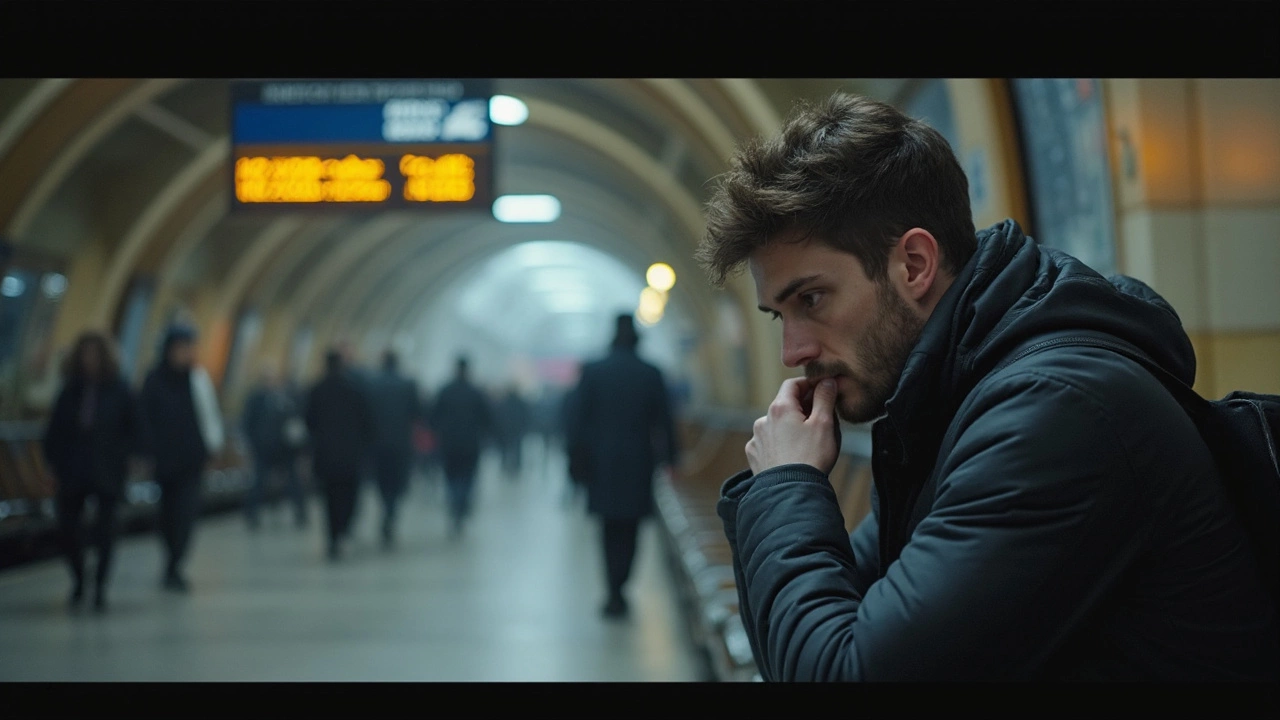Trip Anxiety: What Really Causes It During Weekend Getaways?
 Jun, 3 2025
Jun, 3 2025
Trip anxiety isn’t just in your head—it’s something a lot of us feel, even if we love the idea of a weekend getaway. Ever noticed your heart racing the night before a little trip? Or maybe you keep checking your bag, even though you packed everything twice. That weird mix of excitement and worry can make it feel like you’re about to take a final exam, not just drive out of town for two days.
Lots of things trigger trip anxiety—sometimes it’s about leaving your comfort zone, other times it’s because you fear forgetting something important or losing control of your schedule. Travel throws your routine out the window. Even something as simple as “did I turn off the stove?” can spiral into a wave of worry that keeps you up at night.
The good news? You’re definitely not alone. And once you see what’s really behind those anxious feelings, it gets a lot easier to do something about them. Stick around, because we’ll break down the main causes and share some tricks that actually help you feel calm, not frazzled, as you head out on your next short escape.
- The Real Reasons Behind Trip Anxiety
- How Your Mind and Body Respond
- Common Triggers: From Packing to Planning
- Quick Fixes and Coping Hacks
- Making Your Next Getaway Stress-Free
The Real Reasons Behind Trip Anxiety
So what actually causes that buzz of nerves before a simple weekend getaway? Most of the time, it isn’t just about the trip itself. The brain is wired to look for security and predictability, so tossing your usual routine out the window (even for a little adventure) can make your stress system overreact.
One major factor behind trip anxiety is fear of the unknown. Even if your getaway is close to home, not knowing exactly what’ll happen—what the traffic will be like, if the Airbnb’s as nice as the photos, or where you’ll eat—triggers your body’s “better safe than sorry” mode. Another biggie: loss of control. People who like having a set plan or sticking to habits can feel thrown off when little things (packing, finding keys, double-checking reservations) go off script.
And then there’s decision overload. Weekend getaways should be chill, but studies have shown that making lots of small decisions (what to pack, when to leave, pet arrangements) piles up fast—one survey found that 62% of Americans feel stressed just from the planning stage of travel.
| Factor | How It Triggers Anxiety |
|---|---|
| Uncertainty | Not knowing what to expect raises stress hormones like cortisol. |
| Planning Pressure | Dealing with bookings, packing, and logistics increases mental strain. |
| Leaving Comfort Zone | Breaking daily routines can be unsettling, especially for anxious personalities. |
| Decision Fatigue | Lots of small choices drain mental energy, leading to overwhelm. |
Certain personality types are more prone to this. If you already have anxiety, travel might crank it up. But even folks who usually have nerves of steel can feel a rise in stress on travel days because there are so many unknowns and risks—lost luggage, delays, last-minute changes.
The trick is recognizing these triggers instead of pretending they don’t exist. If you can spot what bothers you, it’s way easier to handle it before it gets out of hand. Next, let's talk about what’s actually happening inside your brain and body during those pre-trip jitters.
How Your Mind and Body Respond
Our bodies are built to handle stress, but when it comes to trip anxiety, the way our brains and nerves react can feel out of proportion to the actual situation. That all-too-familiar knot in your stomach? It’s your body getting ready for what it thinks is a big deal—like facing danger—even if you’re just packing a suitcase.
When anxiety kicks in, your brain’s amygdala (the part that fires up when something seems risky) sends your body into "fight or flight." You might notice a faster heart rate, shallow breathing, or sweaty palms. These are classic signs—a primitive alarm system meant to help our ancestors dodge saber-toothed tigers, but nowadays, it gets triggered by things like train tickets or traffic jams.
Your mind also goes into overdrive. Some folks get stuck overthinking: “Did I book the right hotel? Will I get lost? Did I bring enough socks?” Sleep can get patchy the night before a trip. According to a 2023 survey by Booking.com, 38% of travelers admitted to losing sleep before short trips because of these worries.
- You might second-guess every part of your packing list.
- Appetite might drop, or you could lean into junk food for comfort.
- Some people feel more irritable or find it hard to focus.
If you want to see the difference in physical symptoms between trip anxiety and normal excitement, check out this quick table:
| Symptom | Normal Excitement | Trip Anxiety |
|---|---|---|
| Heart Rate | Slight boost | Racing or pounding |
| Sleep | Mainly restful, might wake up early | Trouble falling or staying asleep |
| Thoughts | Looking forward to trip | Worrying about what could go wrong |
| Body Feel | Butterflies (good kind) | Knots, nausea, or muscle tension |
Knowing how your body and mind might react can help you get ready for these feelings, instead of letting them hijack your weekend plans. Tools like deep breathing, listing what you can control, and giving yourself extra time all make a real difference—especially if you start noticing the signals early, before panic takes over.

Common Triggers: From Packing to Planning
The weird thing about trip anxiety is it usually kicks in before you even leave the house. Packing is where it all starts. Most people admit they stress the most over what to bring, what to leave, and whether they’ll forget that one important thing. An American Psychological Association survey in 2023 found that 40% of weekend travelers felt their anxiety levels spike while packing, not actually traveling.
It’s easy to see why. When you pack, you’re constantly making decisions: Do I need this? Is the weather going to change? What if we end up somewhere fancy for dinner? This creates decision fatigue—your brain gets tired really fast from all the little choices. Overthinking every possible outcome is exhausting.
Planning things out brings up another trigger: wanting to control everything. But no plan survives first contact with real life. Unpredictability—the traffic jam, sudden rainstorm, or a sight being closed—leaves you feeling off-balance. One study published in the Journal of Travel Research found almost one in three weekend trippers got anxious just from planning activities, not the trip itself.
Then there’s the fear of forgetting crucial stuff. This is why people double or triple-check doors, lights, and bags. Forbes did a travel poll that showed 64% of travelers worried about forgetting something, and 33% had actually turned around to grab a forgotten item.
If you’re a data nerd, here’s a quick look at how it adds up:
| Trigger | % of Weekend Travelers Affected |
|---|---|
| Packing worries | 40% |
| Fear of forgetting something | 64% |
| Stress while planning | 32% |
| Rechecking bags/home | 55% |
So what can you do? Simple tools like checklists go a long way. The fewer decisions you have to make last-minute, the less your brain freaks out. Try a standard packing list on your phone for every getaway. Anything to cut down on the constant "what if I forget...?" thoughts helps.
- Use a master packing checklist and update it after each trip—takes five minutes, saves you tons of stress.
- Plan basics, but don’t micromanage. Leave room for things to go sideways—it’s kind of part of the fun.
- Pack for weather and one “surprise” event—no need for a different outfit for every hour.
Point is: trip anxiety loves an open door. Shutting it isn’t about being perfect. It’s just about setting up little routines that stop you from getting overwhelmed before the fun even starts.
Quick Fixes and Coping Hacks
If trip anxiety hits, you don't need to just ride it out. There are real, doable things you can try right away so you can actually enjoy your weekend away. The trick is a mix of planning ahead and knowing what to do in the moment if those anxious feels try to creep in.
Start with the basics. The Anxiety and Depression Association of America (ADAA) says routines help settle your mind—so try sticking to regular mealtimes and sleep, even when you're away. Here are some practical ways to keep your stress low and your mood up:
- Pack a worry-list: Before you leave, write down the stuff you can't control (like missing a train or forgetting toothpaste). This helps your brain move out of "what if" mode. Researchers at the University of Chicago found that simply writing your worries down can lower anxiety and make decision-making easier.
- Scan and save: Take photos of your ID, health card, and booking details. Keep them in your phone, so if you misplace something, you don’t freak out. Travel surveys show over 35% of people lose documents at least once while traveling.
- Plan—but stay flexible: Make a loose plan so you know where to go and what to expect, but leave some buffer time. Not every hour needs to be scheduled tight. Most travel experts agree that over-scheduling actually triggers more anxiety than winging it.
- Bring a comfort item: Toss in a familiar snack, favorite hoodie, or a small squishy toy—something that makes you feel grounded. About 60% of travelers say having something from home helps them relax.
- Breathe it out: Try the "4-7-8" breathing trick: breathe in for 4 seconds, hold for 7, and breathe out for 8. This simple technique lowers heart rate and calms your nervous system fast.
If you're someone who likes the numbers, check this out:
| Strategy | Reported Effectiveness (%) |
|---|---|
| Breathing Exercises | 72 |
| Comfort Items | 60 |
| Digital Copies of Travel Docs | 80 |
| Making a Worry List | 65 |
No fix works for everyone, so try out a couple and see what sticks. The main thing is—don’t let stress boss you around. With a few simple tricks, you can give yourself a real shot at a calm and fun weekend getaway.

Making Your Next Getaway Stress-Free
Packing up for a quick break doesn’t have to turn you into a ball of nerves. You can actually cut your trip anxiety way down with a few small tweaks to your routine. Here’s where it pays off to get a bit strategic.
First, make checklists. According to the Anxiety and Depression Association of America, "Having a simple checklist for travel lessens the number of things you juggle in your head and gives a sense of control."
"Writing down your travel steps takes anxiety out of your head and puts it on paper – this is a game-changer for many anxious travelers," says Dr. Alicia Clark, psychologist and author.
Use your phone to keep a digital list or stick with pen and paper—whatever actually works for you. The key is to start this list a few days before you leave so you’re not scrambling at the last minute.
Next, get realistic about what happens if things go off-track. Missed a train? Most trips have wiggle room. In fact, a 2023 survey by TripIt found that travelers who budgeted extra time reported 25% less stress than those who didn't.
Here are a few tips you can use right away:
- Pack your bag the night before, not the morning of. You’re more clear-headed and less likely to miss essentials.
- Set reminders on your phone for things like "turn off the stove" or "check the windows." That way, you won’t keep playing mental loops during your trip.
- Share your itinerary with a friend or family member. If something’s delayed, you'll have someone who knows your plans.
- Plan a little buffer into your schedule so you’re not racing everywhere—leave at least 20-30 minutes extra for travel, especially during busy weekends.
For a quick look at what really eases travel stress, check this data from a 2024 travel study:
| Strategy | Percentage of Travelers Who Felt Less Stressed |
|---|---|
| Using checklists | 79% |
| Leaving buffer time | 72% |
| Traveling with a friend | 58% |
| Using travel apps | 55% |
Little tweaks like these really add up. It’s all about making space for things to go wrong but knowing you’re ready if they do. Your weekend getaway should be about fun, not spinning in circles. Tweak your habits, stretch your timeline a bit, and you’ll finally get that relaxing break you’ve been imagining.
